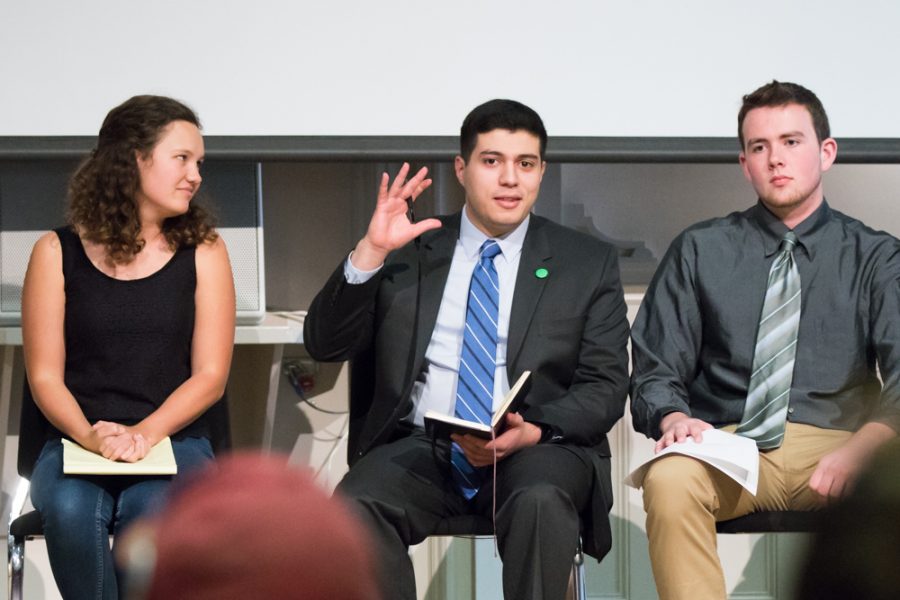A little more than a year after various student and faculty discussions began regarding Whitman’s divestment against fossil fuels, the Whitman Board of Trustees released an official statement on the movement deciding not to pursue divestment at this point in time. The response was sent out in an email by the Associated Students of Whitman College on the morning of Saturday, Feb. 8.
The statement holds that the board does not consider Whitman’s divestment from companies that invest in fossil fuels to be in the best interest of the college. While members of the board agree that the impact of climate change on our environment is cause for concern, they also believe that divesting the college’s endowment from fossil fuel companies would place the college in an unstable situation to meet other obligations the college holds.
“We reviewed and talked about the ways we support the objective of the movement. We talked about ways that we could address the problem of climate change. But at this time, we didn’t think the trade-off of trying to implement this divestment would be prudent given our objective to maximize returns on our portfolio and how it’s managed,” said Chair of the Board of Trustees Peter van Oppen ’74.
About two percent of the college’s endowment is invested in fossil fuel companies, according to the statement provided by the board. However, the endowment itself is invested in fund managers rather than individual companies and the two percent holdings are held by fund managers that control more than 25 percent of the college’s overall investment portfolio. This means that should the college divest from the few companies that hold investments in fossil fuel energies, the college would lose a significant amount of potential return on their investments because they would have to switch fund managers completely.
“It’s very difficult for us to tell the portfolio managers to invest or not invest in specific companies. We often manage our diversity by picking managers who focus on emerging markets, or large cap stocks, or domestic stocks, or European stocks––all with very diverse criteria. But within those criteria some of those managers’ portfolios may have some energy-based holdings. So it’s very difficult for us to dictate what they hold and don’t hold,” he said.
van Oppen notes that since the campus began discussions of divestment, the Board seriously analyzed the impact of divesting the endowment from fossil fuel companies. And while the Board has decided not to divest from investments in fossil fuel companies at this time, the Board agrees with the moral argument of the movement and plans to maintain its commitment to environmental sustainability in other various ways.
“We concluded that it was difficult and largely ineffective to divest from these companies given the difficulty of balancing the challenge and effect. We reviewed and talked about the ways we support the objective of the petition and we talked about ways that we could highlight the problem,” said van Oppen. “But at this time, we didn’t think the trade-off of trying to implement this divestment would be prudent given our objective to maximize returns on our portfolio and how it’s managed.”
Following a student panel held to discuss the pros and cons of divestment and petitions and letters sent to the trustees from students urging divestment last year, ASWC passed resolution SRS 13.3. One of its the major goals was to create a committee comprised of board members, students, faculty and staff that could explore the effects of fossil fuel divestment on the endowment. Sophomore and ASWC Vice President Jack Percival, who originally co-wrote the resolution, felt that although the college didn’t meet the exact goals of the resolution, he believes that the board took the resolution into consideration when coming to their decision.
“I think the resolution was taken very seriously,” said Percival. “The resolution created a moral argument stating that global carbon emissions are cause for concern, and the trustees affirmed that they agree with the moral argument––they just didn’t feel comfortable divesting at this time.”
Junior and ASWC President Tim Reed also agrees that the statement by the board is noteworthy and indicates that the board understands the concerns of the student body.
“The trustees were very engaged in this, and I feel like they very much so took the resolution as a jumping off point for this discussion,” he said. “It’s been really great to see how the development of this resolution was brought to the trustees. It was something that they engaged substantially about and I think they really took it as ‘This really is the student voice. Is this a feasible thing? Can we do this?’ To get a formal response from the trustees is pretty impressive and a noteworthy thing to happen.”
Members of the Divest Whitman campaign, while understandably disappointed with the statement, are happy that some form of formal response has been released to the wider public. Divest Whitman member and junior Audrey Vaughan, who met with the trustees on Friday, Feb. 7 to discuss the pros and cons of divestment, says that she’s not entirely surprised by the decision but would like to see a concrete vision for how the college can uphold its commitment to be a leader of environmental sustainability.
“My impression from the meeting was that on an individual level, the trustees were very sympathetic to our cause. They all acknowledged that climate change is happening and that Whitman has a duty to address climate change. Many expressed support of making campus more sustainable, but they didn’t feel that divestment was the right option and that it wasn’t the right time for a committee to look at sustainable divesting,” she said. “What I would have liked to see is tangible steps––steps that students, faculty and staff can do during that time and what we can do to make it happen.”
Vaughan also notes that while a formal response has finally given the Divest Whitman campaign substance to move off of, she wishes that the board’s process for coming to their decision had been made more public during the time the board was looking into divestment.
“I’m really happy that it took a long time [for the board to release their statement], because that indicates that it was a well-thought out decision,” she said. “However, I wish they would let us know what they were doing more. We had no idea that they had made a committee on divestment or that research had been done. I think this would have been a really great opportunity to engage students in the process.”
Despite the board’s statement, Vaughan believes that the Divest Whitman campaign will continue its presence on campus and will look into other avenues for campus sustainability. While the campaign is still reconsidering its options, they plan to look to what other campus campaigns in similar situations have done to move forward. In addition, Vaughan notes that the board has indicated that if the campaign finds fund managers invested in green companies, the board may take their suggestions into consideration.
“This is not the end of the divestment campaign,” said Vaughan. “I know a lot of other colleges have gotten nos from their trustees, so we’re going to be looking at what they’ve been doing. We’re considering other avenues of looking at divestment. We might talk to [the Whitman Investment Company] and other faculty about it.”
Editors’ note Feb. 9, 2014, 12:55 p.m.: A previous version of this article referred to the Whitman Investment Company as “the Whitman Investment Club.”








